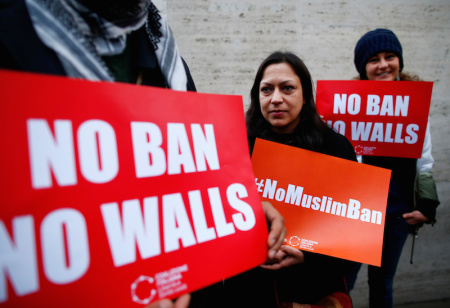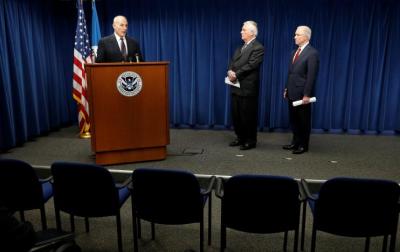Trump's New Travel Ban Doesn't Give Priority to Persecuted Religious Minorities

President Donald Trump signed another executive order on immigration Monday that acts as somewhat of a revision to his Jan. 27 executive order that barred refugee resettlement for 120 days and immigration from seven, now six, Muslim-majority countries for a period of 90 days.
Considering the fact that elements of Trump's first immigration order were struck down in federal court and are currently entangled in a legal battle, Monday's executive order contains a few major changes that the administration is hopeful will make it more successful in overcoming legal challenges.
While the previous order called for persecuted religious minority refugees to receive priority for resettlement in the United States, Monday's order omits language that would give persecuted religious minorities special status in the State Department's refugee resettlement process.
The persecuted religious minority prioritization aspect of the Jan. 27 order came under much scrutiny from opponents, especially after Trump agreed in an interview with CBN News after the order was signed that he believes that persecuted Christians should receive special priority in the resettlement process.
The omittance of priority for persecuted religious minorities in the new order brings dismay to some international religious freedom advocates who have called for the U.S. to give priority to religious minorities facing persecution for their faith worldwide.
The new order also does not include language banning Syrian refugee resettlement for an indefinite period of time. However, the new order still has in place a blanket ban on refugee resettlement for a period of 120 days.
Unlike the Jan. 27 order, the new executive order allows for refugees who have already been vetted and scheduled for resettlement to enter the U.S.

"The State Department will implement the provisions in this order that allow for the admissions of refugees when it is determined that they do not pose a risk to the security or welfare of the United States," Sec. of State Rex Tillerson said during a press conference Monday morning.
The new order also bans for 90 days immigration from six Muslim-majority countries — Sudan, Syria, Iran, Libya, Somalia and Yemen. Iraq was listed along with the other six countries in the Jan. 27 order but is not included in the immigration ban issued in Monday's order.
Additionally, lawful green card holders and visa holders are exempt from the 90-day ban.
According to Tillerson, after Trump issued the Jan. 27 order, the State Department's consular affairs and diplomatic security offices immediately conducted a review, in coordination with the Department of Homeland Security, to strengthen vetting measures in the seven designated countries.
"These early efforts were concentrated on Iraq," Tillerson said. "This intense review over the past month identified multiple security measures that the State Department and the government of Iraq that will be implemented to achieve our shared objective of preventing those with criminal or terroristic intent from reaching the United States."
As the point of the order is to strengthen vetting measures in order to prevent terrorists from taking advantage of the U.S. refugee resettlement system, Attorney General Jeff Sessions said during the press conference that there are at least 300 people who came to the U.S. as refugees being investigated by the FBI for "potential terrorism-related activities."
Like the Jan. 27 order, Monday's order also limits the number of refugees to be resettled into the U.S. in fiscal year 2017 to just 50,000. In 2016, the U.S. resettled about 85,000 refugees. Former President Barack Obama increased the cap to 110,000 in fiscal year 2017 before leaving office.
Monday's order will not go into effect until March 16. According to NPR, the purpose of the delayed implementation is to avoid the chaos at the airports and to allow for authorities to understand the order before they are required to enforce it.
There have been a wide variety of reactions to the new order.
Refugee resettlement agencies still stand very much opposed to the new order. Considering the fact that already over 35,000 refugees have been resettled in fiscal year 2017, the 50,000-refugee cap has put leading refugee resettlement agencies into a bit of a budget conundrum, as they only receive per-refugee funding from the federal government.
"The issuance of a new executive order on refugees and immigrants acknowledges that there were significant problems with the first executive order that caught up green card holders and others as they tried to enter to the United States," Tim Breene, CEO of the evangelical refugee resettlement agency World Relief, said in a statement. "However, this new executive order does not solve the root problems with the initial order — the cutting of refugee admissions by 55 percent and the inability for some of the world's most vulnerable refugees to come to the United States, it is more of the same."
Linda Hartke, the president of the second largest resettlement agency in the U.S., Lutheran Immigration and Refugee Service, said in a statement that the new order "still prevents us from undertaking life-saving work during the most critical time for refugees and displaced persons in human history."
"The new order doubles down on demonizing refugees —implying that America should fear those who have been persecuted, tortured, threatened, and victimized by terrorists," Hartke said. "America is diminished when we abandon our values and close our doors."
Those involved in the refugee resettlement industry have been critical of the refugee ban and the call to revamp the vetting process. Hartke said that there is "no credible reason to halt the refugee resettlement program, even just temporarily, while this review takes place. Pausing the refugee resettlement program, and reducing the number of refugees resettled over this fiscal year, puts vulnerable families fleeing violence and persecution at increased risk."
The new order also drew criticism from both sides of the political spectrum.
Liberal groups like the American Civil Liberties Union, have voiced their opposition to the order and claim that it is based on "anti-Muslim prejudice."
David French, a conservative who opposed Trump during the election, argued that the new order is a "huge retreat" from his campaign promise to ban Muslim immigration.
"If Trump backed down on the Muslim ban this bigly in the primary, he would have been torched from the right. Huge retreat," National Review columnist David French wrote on Twitter.
Ali Noorani, the executive director of the National Immigration Forum, also took to Twitter to voice his disapproval of the order.
"A scaled back ban on Muslim travel is still a ban," he wrote. "The intent has always been clear. And this does little to address security."





















